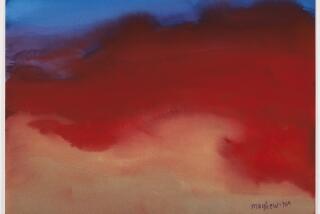SURVIVAL OF THE HIPPEST
Consider the musical evolution of saxophonist Bud Shank.
The restless alto player, who turns 72 this month, came out of the Stan Kenton orchestra to lead the West Coast jazz scene in the ‘50s. He introduced jazz to bossa nova in the ‘50s and ‘60s, and chamber music to California cool in the ‘70s. He’s led classically influenced piano-flute duets, Latin fusion sessions and, most recently, dynamic hard-bop combos that are anything but laid-back.
So it’s surprising that the most emphatic point Shank made during a 45-minute phone conversation earlier this week from Studio City was that he doesn’t consider himself an innovator.
“Guys like Lee Konitz, Charlie Parker. Those people are true innovators. I’m not in that category.”
Others would argue. When reminded of his contributions and the fact that his first recordings with Brazilian guitarist Laurindo Almeida predate the Stan Getz-Antonio Carlos Jobim collaborations by a number of years, he gives the verbal equivalent of a shrug.
“I’ve tried to explore things as much as possible and do them the best I can,” he said. “I’ve ended up in a lot of different places, and I’ve enjoyed going to all of them. When I get to the point [where] I don’t feel I’m learning anymore or striving for new things, I’ll quit. But that’s not what’s happening right now.”
Indeed, Shank is as active as ever. He’s in the middle of a tour that brings him to Steamers Cafe in Fullerton on Sunday. Then he’ll fly to New York for three nights at Birdland. Future dates find him in Canada, New Mexico, the Netherlands and Germany.
In July, he’ll be ensconced in his hometown of Port Townsend, Wash., for the 15th annual Bud Shank Jazz Workshop. It’s a weeklong festival of clinics and concerts featuring a host of notable musicians. Shank returns to Orange County on Labor Day weekend to headline the annual West Coast Jazz Party.
On top of all that, he said he’s practicing more than ever. “I can see the results. I’m comfortable doing more difficult things.” And then, with an ironic twist in his voice: “I’m in a period of maturity.”
Upcoming reissues show a maturity that stretches back to Shank’s earliest recordings. As part of its “West Coast Classics” series to be released next week, Blue Note has selected a CD’s worth of recordings Shank made with saxophonist Bill Perkins for the Pacific Jazz label between 1955 and 1958. Sidemen included pianists Russ Freeman, Hampton Hawes and Jimmy Rowles as well as bassist Red Mitchell and drummer Shelly Manne.
A more complete picture of Shank’s recordings for the label--a five CD, seven LP set titled “The Pacific Jazz Bud Shank Studio Sessions: 1956-1961”--will be released in June by the Mosaic label. “All of a sudden,” he said, “my past is running in front of me.
“When I was putting together [the Mosaic collection] and listening to the finished product, I realized what a big change there was during that period in my playing. That was just before jazz went in the toilet, replaced by the Beatles and the Beach Boys. For 15 years, there was no interest, no place to play.”
Luckily, the movie and television industry provided Shank with steady employment. He contributed to such films as “The Thomas Crown Affair,” “The Sandpiper” and “Summer of ‘42,” as well as composing countless commercial jingles.
*
In the ‘70s, Shank, tiring of session work, put more emphasis on being a jazz soloist. He banded together with guitarist Almeida and bassist Ray Brown and, in 1974, they formed the L.A. Jazz Quartet with drummer Chuck Flores (later Shelly Manne, then Jeff Hamilton). The band’s sophisticated, acoustic approach seemed reactionary against the surging tide of electric and fusion jazz.
“When we came out with the L.A. Four, it was like sticking your toe in to test the waters,” he said. “We didn’t know if it was going to work, if people were going to like it. It was based more on classical music than jazz.”
The group’s blend of chamber jazz, samba and bossa nova proved immensely popular among jazz devotees. But when the group disbanded about 1985, Shank began to take a more dynamic approach to his music, recording with such sidemen as pianist Kenny Barron and Ron Carter, while participating in reunion bands he co-led at the fabled Lighthouse jazz club in Hermosa Beach with trumpeter Shorty Rogers.
“I really started developing again after [the L.A. Four],” he said. “I’ve done a lot of maturing in the last 15 years.”
He’s looking forward to a project based on the music of Gerry Mulligan. “I don’t want to do just the older, more familiar material that Mulligan wrote, but concentrate on some of the more recent things. He wrote some marvelous things later on, some that never got recorded.”
And what about the possibility of retiring? Countered Shank: “What’s that?”
* Bud Shank Quartet, with pianist Mike Wofford, bassist Bob Magnusson and drummer Joe LaBarbera, performs Sunday at Steamers Cafe, 138 W. Commonwealth Ave., Fullerton. 7:30 p.m. Two-item minimum. (714) 871-8800.
More to Read
Sign up for The Wild
We’ll help you find the best places to hike, bike and run, as well as the perfect silent spots for meditation and yoga.
You may occasionally receive promotional content from the Los Angeles Times.






